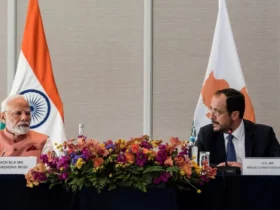I was only 21 back in 1979. The most famous song at that time was “Another Brick in the Wall” by the British rock group Pink Floyd, an anthem which swept the world with its explicit defiance of the British educational system. It was a powerful song that described teachers as “just another brick in the wall” and urged children to rise against the British education system, which was based on beatings and strict discipline. Exactly 41 years after this song was released, on May 25, 2020, the murder of a black man named George Floyd in Minneapolis by the police has sparked a wave of riots. This wave has started a process which has destroyed the American dream, nullified the Washington Consensus and, most importantly, crumbled the integrity of the United States, built on oppressive structures not unlike those described in Pink Floyd’s “The Wall”.
THE WALLS ARE BEING TORN DOWN
The wall has already been torn down on a psychological level. The wall was a symbol of encirclement, something which included Turkey too, after 1946. This wall had tried to suffocate our nation in every field, from FETO to PKK; from the Eastern Mediterranean to the Black Sea, from the threat of dollar fluctuations to the economic embargoes. Turkey must understand that the wall has been torn down, for both the people and the state. Those within the Turkish establishment, who rely on the United States in every field, should take lessons from the post-Floyd period. The United States has not been able to manage the COVID-19 crisis or the wave of indignation following Floyd’s death. The US government is in such internal conflict the nation itself appears at the verge of collapse.
A state that spends $82 billion every year on its intelligence services has failed to foresee the devastating internal potential of instability, and has fallen almost to a level of a failed state. It is a serious problem that this country still holds onto claims to be a strategic player in our region and causes instability within our country mainly through the FETO leader and the PKK organization which they fund and support. Our people and our state met with the true face of this very presence through FETO in the July 15th 2016 coup attempt. That face was the face of imperialism.

IMPERIALISM DOES NOT WANT MARITIMIZATION, NOR NATIONALIZATION
Up to this day, imperialism has spread through its domination of the seas. It never let a rival challenge it on this front. In the post-Cold War era and up to the present day, our Naval Forces have become a primary target for the US state mechanisms, particularly under the Neocon leadership that emerged after September 11th, 2001. After 2007, purges took place against Admirals and officers who came up with new ideas in the Navy, outside of NATO and the Atlantic strategic interests: ideas that could have benefited Turkish maritime interests. Then, numerous plots, particularly the Ergenekon and the Sledgehammer trials, were carried out by FETO, further complicating the situation.
The purges were carried out at a level not seen since the French Revolution. Yet, the purges were not enough. To make an example for those who were left untouched and even for retired personnel, hundreds of active duty and retired admirals, officers and NCOs were put behind the bars with only short digital documents forged about a fake coup plot.
This period, which will be remembered as the darkest and most shameful page in the Turkish History, was carried on shamelessly and ravenously knowing no limits until 2013, when a lead figure from the government party stated that, “The National Army is being plotted against”. This treacherous process carried out by the FETO was closely observed by the United States and the EU and was supported implicitly. Even the European Court of Human Rights had been used as an instrument at one point in this process. There was only one goal of this process, in which the list of discharged was published by the media of FETO long before: preventing Turkey from producing national and homegrown policies, strategies, concepts and doctrines; its failure to develop its own defense industry, its captivity by the western hegemon.
THINGS DIDN’T GO AS PLANNED
Despite all this, the Naval Forces have developed projects which will challenge these imperialistic goals. State apparatuses have shown their support for these projects, and Turkey has entered the 21st century, dominant in the seas. In this process, despite some groups of traitors associated with FETO, our Navy and only a few national and homegrown decision-makers within the state apparatuses, have made great contributions. After all, the responsibility of the state to protect the geopolitical interests of the future generations, in all three maritime frontiers of our Blue Homeland, could not be handed over or ignored. Since the days of Ataturk, Turkey has not allowed any incident that can cause a loss in terms of maritime interests, or within the Blue Homeland. This principle was carried on even under the domain of the Atlantic system.
IMPERIALISM WOULD NOT GIVE UP
Imperialism will never forgive and would never give up. Allowing a dark and a treacherous organization named FETO to take over the government, it provided the necessary courage and opportunity to conduct plot cases. If we wish to remember how shameless imperialism is, let us not forget that FETO was not satisfied with what it had achieved after the discharges, and wanted to take over the government as a whole on the night of July 15, 2016. But the Turks would not surrender. On the morning of July 16, Turkey woke up to a new world, while suffering 254 martyrs and thousands injured. If the coup had been successful, we would be in a much different country today, in which a brutal civil war would be taking place. The use of the Incirlik Air Base, which also operates as a NATO base, and the fact that the FETO headquarters is in Pennsylvania, US, have caused serious fractures in Turkey’s Atlantic-orientation.
The suspicions about what happened at the Incirlik base that night, and the communications between the US and the Turkish officers are still in question. The truth was never revealed to the public. Ralph Peters retired Lt. Colonel, a military analyst for the FOX News in the United States, and also the author of the famous book “Blood Borders” in 2006, which depicts the borders of the Greater Middle Eastern that tears apart the eastern regions of our country, supported the coup in the early hours, proposing to the United States to support the putschists, saying that “the putschists are on our side.”
IF THE JULY 15 COUP ATTEMPT HAD BEEN SUCCESSFUL…
If the coup attempt had been successful, today we would face the 21st century revival of the spirit of Sevres in every region from the Southeastern Anatolia to Cyprus, from Iraq to Syria, from Cyprus to the Black Sea, and from Lausanne to Montreux. Even though the coup failed, the CIA’s undercover think tank STRATFOR has found the opportunity for a statement published on July 18, 2016, claiming that “this coup attempt will crumble the cohesion and the morale of the Turkish Army, and will eventually reduce its combat ability”, and went even further by saying “the Turkish army will now turn in itself, and try to deal with the harmful consequences of the coup attempt, and the potential threats from the government party. It would take years for the army to recover. However, Turkey does not have that many years.
The instability in the region is deepening by each day and Turkey needs to control this chaos and strengthen its situation.” The Turkish Army and its Navy responded to these assessments with operations of Euphrates Shield, Peace Spring, Mediterranean Shield, Blue Homeland and the Sea Wolf.
However, we cannot say that the Sevres-remnant imperialist bogeyman has stopped roaming among us. The devil spirit is now roaming around the Blue Homeland, among the Mediterranean, Aegean and Black Sea basins.
A PUPPET KURDISTAN
The establishment of a puppet Kurdish state that stretches out to the Mediterranean, and the declaration of an independent Kurdistan, pose the greatest threats to Turkish geopolitics. Today, PKK terror in our Southeast Region is still lurking. The PKK’s branch in Syria, the PYD/YPG, is an enemy of Turkey and now an ally of the United States and many other NATO countries. The recent increases in US’ efforts to merge together the Northern Iraqi Kurdistan Regional Government (KRG), and the PYD/YPG is a very serious national security concern. Finally, the US deployment of some medium-range air defense systems to protect the PKK and its associates, against Turkey, in the Deir ez-Zor region, is also a very serious action taken against Turkey.
The End of the Greater Middle East Project: The Case of Kurdistan
THE INCREASING ANTI-TURKISH SENTIMENT IN THE TRNC
There will be elections in the TRNC soon. It seems that the hostilities against the independence of Turkey and the TRNC have become the most important tool in the election campaign. Even in the nationalist wings, some very strong shakings are present.
The situation is truly grave, and the government, whose primary duty is to protect the state, are sitting silently and supporting fifth column activities which aim to surrender to the Greek Cypriots.
Leaving the fate of the TRNC to the flow of the course of history will be a huge mistake. We need to remember the days that Turkey’s geopolitical security was put in risk, by accepting the Annan Plan.
THE BLUE HOMELAND IS THE EASTERN MEDITERRANEAN FRONT
The situation in the Eastern Mediterranean has entered into a critical stage. In particular, successful military victories of the Turkish-backed Government of National Accord (GNA), against the putschist warlord, General Haftar, have turned the overall political military situation in Libya, in favor of Turkey.
This will result in very positive effects, in the Eastern Mediterranean and on our maritime jurisdiction areas.
The publication of an analysis titled “Haftar will be erased from the political arena in Libya” by the Russian state-owned news agency Ria Novosti, on the June 5, shortly after the withdrawal of the Russian mercenary Wagner Group and shortly after the GNA Leader Sarraj’s visit to Turkey, have been the major achievements in Turkish Eastern Mediterranean policies. However, it should also be remembered that these events will not fully disturb imperialism. We should expect provocations and psychological operations in Libya targeting relations between Turkey and Russia. In parallel with the advancements of the GNA forces, Turkey first declared the “Ne Mutlu Türküm Diyene-How happy is the one who says I am a Turk” (a quote by Ataturk) training sites along the Mediterranean, and then the granting of the exploration license to the Turkish Petroleum Corporation (TPAO) near the Libyan-Turkey maritime border, has brought some statements against Turkey, from the Greece, France and the United States.
On the morning of June 5, 2020, the US State Department announced that they would not recognize the Turkish-Libyan Maritime Deal of November 27, 2019, and on that same day, the Greek Defense Minister stated that “We are ready for a war with Turkey”, which naturally caused tension. In the Eastern Mediterranean, expecting Turkey to accept the EU-made Seville Map and to give up on a maritime jurisdiction of 150,000 square kilometers, would not be comprehensible, either by logic, by heart, or by the law. The entire Aegean Sea is 214,000 square km wide, while the maritime jurisdiction which we risked war over during 1975 and 1976 with Greece, is around 50-60 thousand square km wide. It should be noted that the area which the United States, the EU, Greece and the Greek Cyprus find appropriate for us in the Mediterranean, is 41,000 square km wide.
THE AEGEAN FRONT
The issues of islands with demilitarized status in the Aegean Sea becoming homes to heavy weapons that threaten the Turkish national security, and the issue of ‘’EGAYDAAK-The islands, islets and rocks whose sovereignty not transferred to Greece by treaties” are ongoing. In today’s political environment, in which Libya and the Eastern Mediterranean are the center of gravity in the military and the strategic perspectives, the Aegean issues with Greece should be addressed mainly by diplomatic and political means.
THE BLACK SEA
There are also very important incidents happening in the Black Sea, which is one of the most important fronts of the Blue Homeland, holding the honor of supplying the war logistics of our War of Independence, thus contributing to the Liberation of Anatolia. Over the past week, the sorties of US B-1 heavy bombers with Ukrainian and Romanian fighters flew above the Black Sea supported by a Turkish tanker plane. This evolution has deeply shaken the fragile balances in the region. While these incidents were happening in the north, the loss of Turkey’s two soldiers against the PKK in the southeastern region has deeply affected the nation.
The American militarization of Romania and Black Sea security
The timely appearance of a document named “One Flank, One Threat, One Presence: A Strategy for NATO’s Eastern Flank” published by the Washington DC-based CEPA think tank earlier of the week of B-1 provocation, which suggests some measures that are so dangerous for the Black Sea and some proposals to bring NATO and Russia to the brink of a war, as well as some other uses of articles trying to disrupt the Turkish-Russian rapprochement, through the S-400s, Idlib and Libya in a provocative tone, as a propaganda for the social media outlets associated with FETO, did not go unnoticed.
RUSSIA’S NEW REVIEW OF NUCLEAR DOCTRINE
Shortly after these incidents, Russia issued a decree on the principles of state policy for nuclear deterrence with the signature of President Putin on June 2, 2020. Let us take a look at this decree. The decree says that Russia could resort to its nuclear weapons in a conventional war that would end in a Russian defeat. This document was issued in a political environment in which the US had withdrawn from the Treaties of INF, START and Open Skies; and where NATO has provoked Russia at a strategic level, in a wide region from the Barents Sea to the Black Sea.
At this point, Turkey should seriously reconsider and revise the American nuclear capabilities it holds on its territory on behalf of the United States and NATO.
The decree explains that they see countries that had deployed Ballistic Missile Defense Systems (BMD) and the countries that had deployed nuclear missiles on their territory as potential nuclear targets. Yet, the decree has a new article that did not exist before. Russia introduces a possibility of a nuclear response, if a critical attack on the infrastructure, which could be necessary for the control and use of nuclear weapons (including a cyber-attack) takes place. In summary, Russia is preparing itself for the increasing provocations of the United States and NATO, especially for those through Poland and Romania. As I have mentioned in this article, Turkey should not be an instrument in these provocations by the United States and NATO, in the Black Sea.
ATTACK ON THE MONTREUX CONVENTION
On the other hand, after the debates on the Istanbul Canal were put on the public agenda, a sharp increase in denials of the Montreux Convention began in US-based think tanks. An article published by the US-based Center for International Maritime Security (CIMSEC) on June 1, titled “Let me get this Strait: the Turkish Straits Question Revisited”. This article has revealed how correct we were in the concerns we mentioned regarding the Istanbul Canal. Imperialism hates legal restrictions regarding the movement of naval power. That is why Montreux has been targeted by the United States since the day it was signed. In this article, while emphasizing that it would be in the interests of the United States to question the Montreux Convention, the possibility of Freedom of Navigation Operation (FONOPS) by the United States in the Marmara Sea is also mentioned, which is in a status of inland waters. However, while mentioning the presence of a strong Turkish Naval Force in Golcuk being able to prevent this, it also mentions that a new regime of the straits will not be possible, until the Turkish Navy is totally eliminated.
This is unbelievable! Another serious issue related to the Istanbul Canal. Sadly, the article makes its argument citing our own statesmen’s previous words on opening up the Montreux Convention to debate in order to promote the Istanbul Canal. The legal integrity of the Çanakkale, the Sea of Marmara and the Istanbul Strait, which is guaranteed in the Montreux Convention will be disrupted by this Canal, raising the questions of implementation of the Montreux Convention. In short, the hornet’s nest is being stirred. The Convention, which we have been carefully protecting for the last 84 years, is now being opened to debate. Pro-mandate groups are experiencing such joy these days with the release of CEPA and CIMSEC documents, as NATO and the United States continue their provocations and stockpiling in the Black Sea! In this context, it is absolutely clear that the subsequent publications of these documents at the same moment B-1 bombers are being refueled in the air above the Black Sea is no coincidence.
On the other hand, I hope that those who did not understand how much damage the Istanbul Canal Project will cause for the Montreux Convention will now probably have a little more common sense given that the US’ has now more or less revealed their intentions.

















Leave a Reply